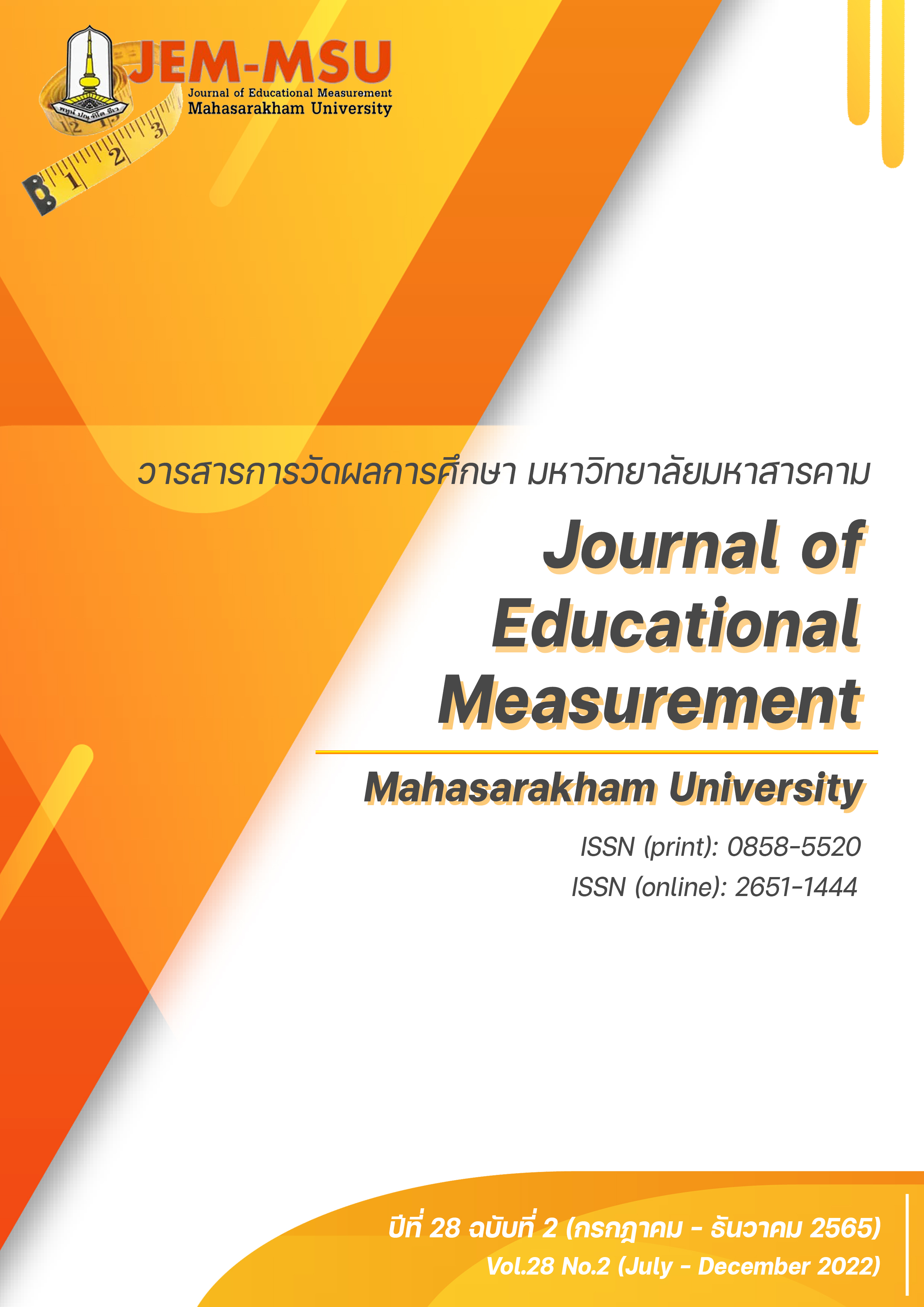การพัฒนาแนวทางการส่งเสริมความสามารถด้านการวิจัยของครูโรงเรียนโสตศึกษา ในเขตภาคตะวันออกเฉียงเหนือ
Main Article Content
บทคัดย่อ
การวิจัยครั้งนี้มีความมุ่งหมายเพื่อ 1) สร้างแนวทางการส่งเสริมความสามารถด้านการวิจัย 2) เปรียบเทียบความสามารถด้านการวิจัยกับเกณฑ์ร้อยละ 70 และ 3) ประเมินแนวทางการส่งเสริมความสามารถด้านการวิจัยของครูโรงเรียนโสตศึกษาในเขตภาคตะวันออกเฉียงเหนือ โดยใช้วิธีการวิจัยและพัฒนา (research and development) ตัวอย่างประกอบด้วย 1) ผู้ทรงคุณวุฒิสำหรับการสนทนากลุ่ม จำนวน 7 คน 2) ครูหน่วยทดลอง จำนวน 10 คน และ 3) ผู้บริหารโรงเรียน และครู จำนวน 17 คน เครื่องมือวิจัยประกอบด้วย 1) แบบบันทึกการสนทนากลุ่ม 2) แบบประเมินความเหมาะสมของแนวทางการส่งเสริมความสามารถด้านการวิจัย 3) คู่มือการใช้แนวทางการส่งเสริมความสามารถด้านการวิจัย 4) หลักสูตรฝึกอบรมระยะสั้นเชิงปฏิบัติการด้านการวิจัย 5) แผนการฝึกอบรมระยะสั้น 6) แบบทดสอบความรู้ระเบียบวิธีการวิจัย 7) แบบประเมินทักษะการเขียนรายงานวิจัย 8) แบบสอบถามความสามารถด้านการวิจัยเชิงคุณลักษณะ และ 9) แบบประเมินแนวทางการส่งเสริมความสามารถด้านการวิจัย สถิติที่ใช้วิเคราะห์ข้อมูลประกอบด้วยสถิติพื้นฐาน ได้แก่ ร้อยละ ค่าเฉลี่ย ส่วนเบี่ยงเบนมาตรฐาน และสถิติอ้างอิงสำหรับการทดสอบสมมุติฐานการวิจัย คือ การทดสอบที และการทดสอบลำดับที่โดยเครื่องหมายของวิลค็อกซัน ผลการวิจัยปรากฏดังนี้
1) แนวทางการส่งเสริมความสามารถด้านการวิจัยของครูประกอบด้วย 2 หลักการ คือ 1. หลักการบริหารจัดการเพื่อส่งเสริมความสามารถด้านการวิจัยสำหรับครูประกอบด้วย 9 แนวทาง คือ (1) สร้างเครือข่ายการวิจัยระหว่างโรงเรียนกับสถาบันอุดมศึกษา (2) นำหลักการบริหาร 5W2H มาวางแผนพัฒนาความสามารถด้านการวิจัยของครู (3) สร้างกลยุทธ์ให้ครูเกิดแรงจูงใจในการทำวิจัย (4) วางแผนจัดโครงการส่งเสริมความสามารถด้านการวิจัย (5) พัฒนาหลักสูตรฝึกอบรมระยะสั้นด้านการวิจัย (6) สร้างทีมงานและระบบพี่เลี้ยงด้านการวิจัยสำหรับครู (7) จัดแหล่งให้การศึกษาค้นคว้าข้อมูลทางอินเทอร์เน็ตภายในโรงเรียน (8) จัดตั้งคลินิกให้คำปรึกษาด้านการวิจัยแบบ Online และ (9) เชิญวิทยากรมาให้ความรู้กับครู และ 2. หลักการพัฒนาความสามารถด้านการวิจัยสำหรับครูประกอบด้วย 4 แนวทาง คือ (1) จัดอบรมเชิงปฏิบัติการโดยเน้นการลงมือปฏิบัติ (2) นำกระบวนการ PLC มาขับเคลื่อนการผลิตผลงานวิจัยของครู (3) การให้คำปรึกษาด้านการวิจัยโดยมีที่ปรึกษาที่มีความเชี่ยวชาญ และ (4) การนิเทศ ติดตาม และประเมินผลงานวิจัยของครูโดยระบบการนิเทศภายในโรงเรียน
2) ผลการเปรียบเทียบความสามารถด้านการวิจัยกับเกณฑ์ร้อยละ 70 พบว่า ครูมีความสามารถด้านการวิจัยเชิงความรู้ เชิงทักษะ และเชิงคุณลักษณะสูงกว่าเกณฑ์ร้อยละ 70 อย่างมีนัยสำคัญทางสถิติที่ระดับ 0.05
3) ผลการประเมินแนวทางการส่งเสริมความสามารถด้านการวิจัยของครูโรงเรียนโสตศึกษาในเขตภาคตะวันออกเฉียงเหนือ พบว่า โดยภาพรวมมีความเหมาะสมระดับมากที่สุด
Article Details

อนุญาตภายใต้เงื่อนไข Creative Commons Attribution-NonCommercial-NoDerivatives 4.0 International License.
เนื้อหาและข้อมูลในบทความที่ลงตีพิมพ์ในวารสารการวัดผลการศึกษา มหาวิทยาลัยมหาสารคาม ถือเป็นข้อคิดเห็นและความรับผิดชอบของผู้เขียนบทความโดยตรง ซึ่งกองบรรณาธิการวารสาร ไม่จำเป็นต้องเห็นด้วย หรือร่วมรับผิดชอบใดๆ
บทความ ข้อมูล เนื้อหา รูปภาพ ฯลฯ ที่ได้รับการตีพิมพ์ในวารสารการวัดผลการศึกษา มหาวิทยาลัยมหาสารคาม ถือเป็นลิขสิทธิ์ของวารสารการวัดผลการศึกษา มหาวิทยาลัยมหาสารคาม หากบุคคลหรือหน่วยงานใดต้องการนำทั้งหมดหรือส่วนใดส่วนหนึ่งไปเผยแพร่ต่อหรือกระทำการใดๆ จะต้องได้รับอนุญาตเป็นลายลักษณ์อักษรจากวารสารการวัดผลการศึกษา มหาวิทยาลัยมหาสารคาม ก่อนเท่านั้น
เอกสารอ้างอิง
Anderson, J., el al. (1994). A theory of quality management underlying the Deming management method. Academy of management review, 19(3), 472-509.
Ben, M. (1985). Supervisory behavior in Education. Prentice Hall.
Career Research and Advisory Centre (CRAC) Limited. (2011). Researcher development framework. https://vitae.ac.uk/rdfconditionsofuse
Daly, A. (2010). Social network Theory and Educational Change. Harvard education press.
Drennan, R. (2018). Research management: a handbook for southern African research management offices. University of East Anglia Press.
Fatima, G., et al. (2016). Instructional practices used by special education teachers in classrooms of young children with deafness. Bulletin of Education and Research, 38(1), 89-100.
Karen, S. & Macgregor, C. (2018). Deaf education teacher preparation: A phenomenological case study of a graduate program with a comprehensive philosophy. American Annals of the Deaf, 162(5), 388-418.
Kucuksuleymanoglu, R. (2011). Burnout syndrome levels of teachers in special education schools in turkey. International Journal of Special education, 26(1), 55-63.
Nina, A. et al. (2015). Basic components of developing teachers’ research competence as a condition to improve their competitiveness. Canadian Center of Science and Education, 7(4), 221-227.
Selvi, K. (2016). Teachers’ competencies. International Journal of Philosophy of Culture and Axiology, 7(1), 167-175.
Sindelar, P., Brownell, M., & Billingsley, B. (2010). Special education teacher education research: current status and future directions. Teacher Education and Special Education, 33(1), 8-24.
Stufflebeam. (1998). Standard for evaluation. https://www.wmich.edu/evalctr
Swan, W., Langford, N., Watson, L., & Varey, R. (2000). Viewing the corporate community as a knowledge network. Corporate Communications: An International Journal, 5(2), 97-106.
Taba, H. (1962). Curriculum development: Theory and Practice. Harcourt Brace & World Press.
The National Deaf Children’s Society. (2004). Deaf friendly teaching. London: The National deaf Children’s Society. https://pisan2012.wordpress.com
Wester, K. & Borders, D. (2014). Research competencies in counseling: A Delphi study. Journal of Counseling & Development, 92, 447-458.
Adulwatthanasiri, M. (2009). Consulting techniques: Implementation. Khonkaen University Press. (in Thai)
Arjinsamajarn, C. (2004). New teaching supervision. Chongcharoen Press. (in Thai)
Boonpen, P. (2018). Research competency and the variables affecting successful research: a case study of national research universities. Kasem Bundit Journal, 19(1), 80-81. (in Thai)
Boon-Aiem, P. (2016). An empowerment model for research in lectures of the institute of physical education [Doctoral dissertation]. Naresuan University. (in Thai)
Buranasing, V. (2014). Short course development. http://curriculumnnfe1.blogspot.com
Buasai, S. (2014). Area base collaborative research. Area Base Development Research Journal, 6(3), 123-128. (in Thai)
Buapli, C. (2016). 5W2H analysis. http://59130545v1.blogspot.com (in Thai)
Department of Mental Health. (2003). Basic counseling guide. Ministry of public health Press. (in Thai)
Jamornmann, U. (1990). Project assessment guide. Funny Publishing Press. (in Thai)
Kaiwan, Y. (2016). Research and development of training courses. Chulalongkorn University Press. (in Thai)
Latoontheerakul, N. (2017). PLC Professional learning community and teacher development for students in Thailand 4.0. http://Users/Admin/Desktop/PLC (in Thai)
Office of the Education Council. (2010). Research report on network development and evaluation of educational management. Plearn studio Press. (in Thai)
Office of the Basis Education Commission. (2016). Consulting. Ministry of Education Press. (in Thai)
Patjan, S. & Ruannakarn, P. (2020). The current states and guideline to enhance teacher’s research ability in School of the Deaf in northeastern region. Journal of Ratchasuda College for Research and Development of Persons with Disabilities, 16(2), 98-111. (in Thai)
Patjan, S., Ruannakarn, P., & Phusee-orn, S. (2019). The current states, strengths, weakness, opportunities, and threats of learning and teaching of Roi-Et school for the deaf. Journal of Ratchasuda College for Research and Development of Persons with Disabilities, 15(2), 53-54. (in Thai)
Ritcharoon, P. (2014). Project evaluation techniques. House of Kermist Press. (in Thai)
Ruannakarn, P. (2016). Nonparametric Statistics. Taxila Press. (in Thai)
Ruannakarn, P., Ruannakarn, T., & Pansena, K. (2017). The education quality development and local development by the institute of higher education Mahasarakham university: Case study of kra-bark wittayakham school chuen chom district (Amphoe) Mahasarakham province. Mahasarakham University. (in Thai)
Teachers and Basic Education Personnel Development Bureau. (n.d.). Professional Learning Community. Office of the Basic Education Commission Press. (in Thai)
Tong-art, T. (n.d.). Research Management. https://www.gotoknow.org/posts (in Thai)
Walaisathien, P., Opun, S., Wiset, S., Benchathap, C., & Hasannari, C. (2003). Developer’s work processes and techniques. The Thailand Research Fund Press. (in Thai)
Wongwanich, S. & Wiratchai, N. (2003). Thesis consultation guidelines. Chulalongkorn University Press. (in Thai)
Yamtim, V. (2017). Guidelines of teacher research capacity building in science teacher network professional community. Journal of Education and Human Development Sciences, 1(1), 66-67. (in Thai)

